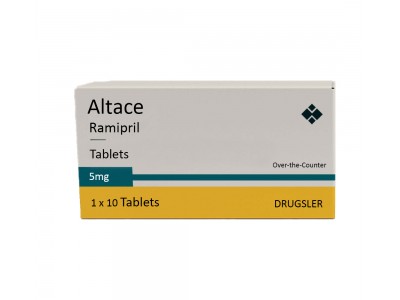What Is Altace (Ramipril)?
Altace, known generically as Ramipril, is an angiotensin-converting enzyme (ACE) inhibitor commonly prescribed to treat various medical conditions, primarily high blood pressure and heart failure. This medication helps relax blood vessels, making it easier for the heart to pump blood.
How Does Altace Work?
The primary mechanism of Altace involves blocking ACE, which reduces the production of angiotensin II, a chemical that narrows blood vessels. This process lowers blood pressure and improves circulation, protecting vital organs like the heart and kidneys.
Primary Uses of Altace (Ramipril)
1. Managing High Blood Pressure
One of the most common uses of Altace is for treating high blood pressure. By reducing vascular resistance, it lowers the risk of stroke and heart attack.
2. Heart Failure and Heart Protection
Ramipril is often prescribed to patients with heart conditions. It improves heart function, prevents heart failure, and is especially useful for post-heart attack care.
3. Kidney Protection
Altace for kidney protection is a significant benefit for patients with diabetes or chronic kidney disease. It reduces proteinuria and delays kidney disease progression.
Additional Benefits:
- Improves survival rates post-heart attack.
- Reduces the need for hospitalization in heart failure patients.
Dosage and Administration
Understanding the correct Altace dosage and administration is crucial. Typical starting doses range from 2.5 mg to 5 mg daily, adjusted based on the patient’s condition and response. Always follow your healthcare provider's recommendations.
Side Effects and Warnings
Common side effects of Altace include dizziness, cough, and fatigue. Rarely, it can cause serious reactions like angioedema or kidney dysfunction. Patients should be aware of Altace side effects and warnings.
Contraindications
Patients with a history of angioedema or hypersensitivity to ACE inhibitors should avoid Ramipril contraindications. It is also not recommended during pregnancy due to potential harm to the fetus.
Is Altace Safe During Pregnancy?
Is Altace safe during pregnancy? The answer is typically no. Ramipril is classified as Category D for pregnancy, indicating a risk of fetal harm.
Conclusion
Altace is a versatile medication offering numerous health benefits, including effective management of high blood pressure, heart protection, and kidney health. However, it is essential to consult a healthcare provider to ensure it is suitable for your specific medical condition.

